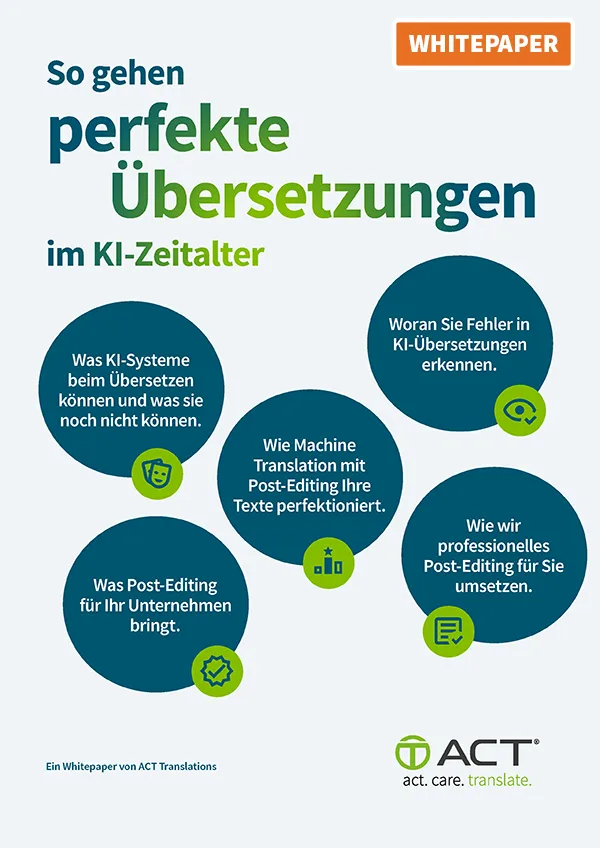They are the export masters: Mechanical and plant engineering companies cater to customers all over the world. Consequently, they need to translate countless documents into the languages of the target countries. Companies that do not take this step seriously put their future existence at risk.
It wasn’t the only mistake in the operating instructions, but ultimately it was the most crucial one: After a woman suffered hearing loss from the loud noise of a leaf blower, she sued the manufacturer for damages and compensation for pain and suffering. The legal basis for this claim: Although the original operating instructions explicitly pointed out this hazard and recommended wearing hearing protection, this information was lost in the German translation.
The question of personal responsibility could be debated in this case. However, from a purely legal point of view, the matter is very clear-cut: Operating instructions, technical manuals, construction manuals, technical documentation, and similar documents are considered part of the product. They are highly relevant in legal terms, which also applies to translated versions. Mistakes in these documents can be quite a nuisance for manufacturers. The legal repercussions are based on several regulations and laws.
Here are some of the most important ones. (Annotation: This text focuses on EU law and German law. Of course, similar national legislation applies in all EU member states.) )
Product liability: When incorrect translation becomes a product defect
What is a defective product? In § 3 of the German Product Liability Act, it is defined as follows: “A product is considered to be defective if it does not provide the safety that can be reasonably expected under consideration of all circumstances […]”. These circumstances also include “any use that can be reasonably expected.”
The typical product defects are design or manufacturing defects. Furthermore, there are errors that occur in product monitoring, which involves ongoing surveying by the manufacturer over the product life cycle. However, apart from these obvious issues, there are also instruction errors, which includes operating instructions, directions, or warnings that are incorrect or inadequate in terms of language and content. Interestingly, instruction errors are the most common product defects in mechanical engineering.
If personal injury, property damage, or financial loss occurs due to an instruction error, a liability for damages arises. The manufacturer is not only liable for the original texts supplied with the product, but also for all translated versions if the company commissioned them. The company must ensure that all translated documents are also complete, comprehensible, and correct.
The EU Machinery Directive specifies: Specialized translators ensure safety and comparability
In May 2006, the Parliament and Council of the European Union published the Machinery Directive, which primarily regulates a uniform level of protection against accidents caused by machinery throughout the EU. In addition to regulating the requirements that operating instructions must fulfil, the directive (or its national transpositions) is also one of the few legal texts that explicitly addresses the subject of professional translations.
According to § 257, the machine must not only be accompanied by the original operating instructions, but also by a high-quality translation if it is sold or put into operation in a member state with a different official language. The purpose is clear: Users should be able to compare the original and the professional translation if they have any doubts. Maintenance instructions only need to be available in the language spoken by the relevant experts.
Book a free initial analysis
Take advantage of our free initial analysis worth €900 for your next translation project. We will show you potential savings and how to optimize your translation processes.
Warranty and compensation: Precision in professional translations saves money
The provisions of the German Civil Code supplement the ProdHaftG (German Product Liability Act) from a different angle: What rights do users have if they suffer damage resulting from a defective product?
§ 434 of the German Civil Code (BGB) is dedicated to material defects. The definition specifying which item is free from material defects is particularly interesting: “if it meets the agreed quality.” This is precisely where an incorrectly translated operating manual comes into play, as it impacts this agreed quality. This factor can entitle customers to withdraw from the contract under certain circumstances.
The question of liability for damages is governed by § 823 BGB: “Anyone who intentionally or negligently causes unlawful harm to another person’s life, body, health, freedom, property, or any other right is required to compensate the other party for the resulting damage.” This wording clearly states that manufacturers are required to ensure that their products comply with all safety standards—including all necessary translations.
In practice, liability will probably remain with the company placing the order, unless it can be proven that the translation service provider was grossly negligent. It also depends on whether liability for translation errors was previously contractually agreed.
Therefore, it is crucial to have the T&Cs translated professionally
Special care must be taken when translating general terms and conditions (T&Cs). § 307 BGB defines this as follows: “Provisions in the general terms and conditions are invalid if they unreasonably disadvantage the contractual partner of the user contrary to the requirements of good faith. An unreasonable disadvantage can also result from the fact that the provision is not clear and comprehensible.”
Therefore, when it comes to professional translations for mechanical engineering, it is not enough to focus on the technical documents. T&Cs also deserve the utmost attention.
The right partner for mechanical and plant engineering: How to find the best translation agency for your professional translations
Poor translations in mechanical and plant engineering can have even more unpleasant consequences. For example, incorrectly translated export documents can cause problems at customs and thus lead to delivery delays and increased storage costs. Even trademark law can be affected if translation errors lead to terminology mix-ups.
Companies that require translations should therefore consider a few key criteria before selecting their translation service provider:
- Certified translation agency: definitely certified according to DIN EN ISO 17100, preferably also according to ISO 9001
- Specific expertise: Involvement of technically competent editors and legal experts
- Use of glossaries for the terminology and translation memory to ensure technically accurate and consistent translations as well as industry-specific terminology throughout
- Native-speaking professional translators
- Collaboration in the translation and communication strategy as well as in quality assurance and quality management
Mechanical and plant engineering companies need translations very often. The resulting costs are disproportionate to the risk associated with self-fabricated solutions or relying purely on machine translation.




